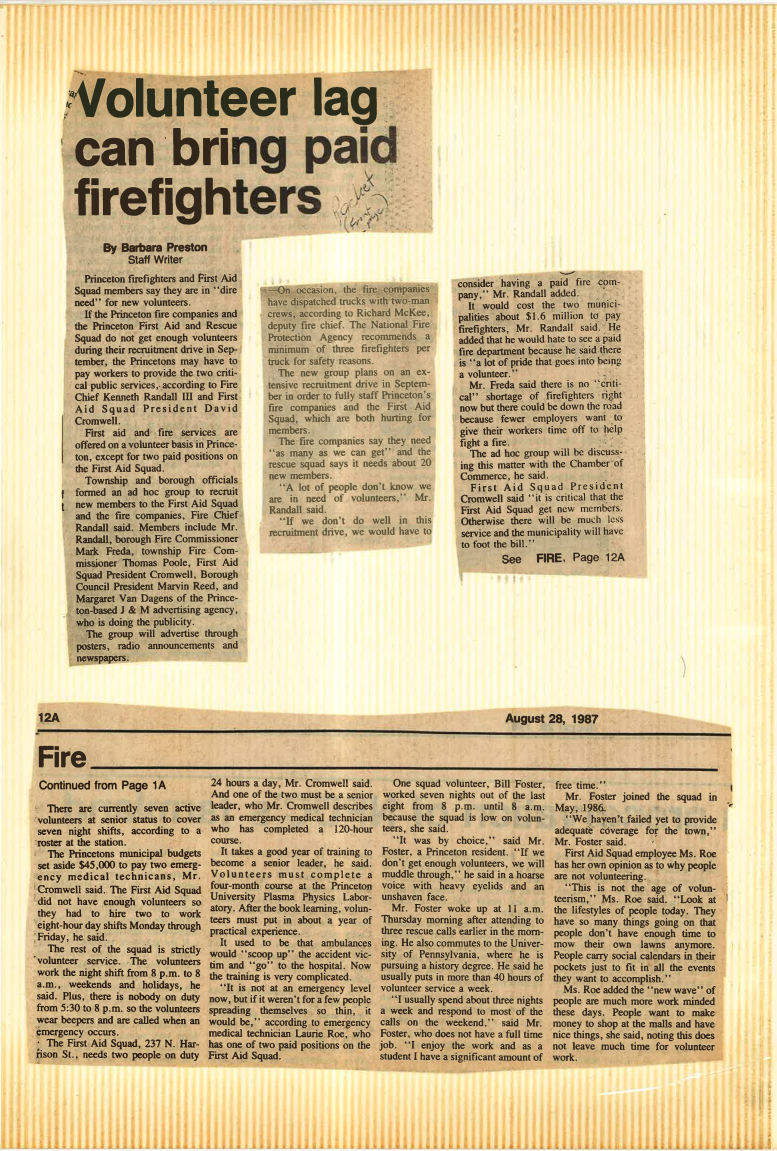
Princeton Packet
28 August, 1987
Volunteer lag can bring paid firefighters
By Barbara Preston
Staff Writer
Princeton firefighters and First Aid Squad members say they are in dire need for new volunteers.
If the Princeton fee companies and the Princeton First Aid and Rescue Squad do not get enough volunteers during their recruitment drive in September, the Princetons may have to pay workers to provide the two critical public services, according to Fire Chief Kenneth Randall III and First Aid Squad President David Cromwell.
First aid and fire services are offered on a volunteer basis in Princeton, except for two paid positions on the First Aid Squad.
Township and borough officials formed an ad hoc group to recruit new members to the First Aid Squad and the free companies, Fire Chief Randall said. Members include Mr. Randall, borough Fire Commissioner Mark Freda, township Fire Commissioner Thomas Poole, First Aid Squad President Cromwell, Borough Council President Marvin Reed, and Margaret Van Dagens of the Princeton based I & M advertising agency, who is doing the publicity.
The group will advertise through posters, radio announcements and newspapers.
On occasion, the fire companies have dispatched trucks with two-man crews, according to Richard McKee, deputy fire chief. The National Fire Protection Agency recommends a minimum of three firefighters per truck for safety reasons.
The new group plans on an extensive recruitment drive in September in order to fully staff Princeton’s fire companies and the First Aid Squad, which are both hurting for members.
The fire companies say they need as many as we can get” and the rescue squad says it needs about 20 new members.
“A lot of people don’t know we are in need of volunteers,” Mr. Randall said.
“If we don’t do well in this recruitment drive, we would have to consider having a paid fire company,” Mr. Randall added.
It would cost the two municipalities about $1.6 million to pay firefighters, Mr. Randall said. He added that he would hate to see a paid fire department because he said.there is “a lot of pride that goes into being a volunteer.”
Mr. Freda said there is no “critical” shortage of firefighters right now but there could be down the road because fewer employers want to give their workers time off to help fight a fire.
The ad hoc group will be discussing this matter with the Chamber of Commerce, he said.
First Aid Squad President Cromwell said “it is critical that the First Aid Squad get new members. Otherwise there will be much less service and the municipality will have to foot the bill.”
There are currently seven active volunteers at senior status to cover seven night shifts, according to a roster at the station.
The Princetons municipal budgets set aside $45,000 to pay two emergency medical technicians, Mr. Cromwell said. The First Aid Squad did not have enough volunteers so they had to hire two to work eight-hour day shifts Monday through Friday, he said.
The rest of the squad is strictly ‘volunteer service. The volunteers work the night shift from 8 p.m. to 8 a.m., weekends and holidays, he said. Plus, there is nobody on duty from 5:30 to 8 p.m. so the volunteers wear beepers and are called when an emergency occurs.
The First Aid Squad, 237 N. Harrison St., needs two people on duty 24 hours a day, Mr. Cromwell said. And one of the two must be a senior leader, who Mr. Cromwell describes as an emergency medical technician who has completed a 120-hour course.
It takes a good year of training to become a senior leader, he said. Volunteers must complete a four-month course at the Princeton University Plasma Physics Laboratory. After the book learning, volunteers must put in about a year of practical experience.
It used to be that ambulances would “scoop up” the accident victim and “go” to the hospital. Now the training is very complicated. “It is not at an emergency level now, but if it weren’t for a few people spreading themselves so thin, it would be,” according to emergency medical technician Laurie Roe, who has one of two paid positions on the First Aid Squad.
One squad volunteer, Bill Foster, worked seven nights out of the last eight from 8 p.m. until 8 a.m. because the squad is low on volunteers, she said.
“It was by choice,” said Mr. Foster, a Princeton resident. “If we don’t get enough volunteers, we will muddle through,” he said in a hoarse voice with heavy eyelids and an unshaven face.
Mr. Foster woke up at 11 a.m. Thursday morning after attending to three rescue calls earlier in the morning. He also commutes to the University of Pennsylvania, where he is pursuing a history degree. He said he usually puts in more than 40 hours of volunteer service a week.
“I usually spend about three nights a week and respond to most of the calls on the weekend.” said Mr. Foster, who does not have a full time job. “I enjoy the work and as a student I have a significant amount of free time.”
Mr. Foster joined the squad in May, 1986.
“We haven’t failed yet to provide adequate coverage for the town,” Mr. Foster said.
First Aid Squad employee Ms. Roe has her own opinion as to why people are not volunteering.
“This is not the age of volunteerism,” Ms. Roe said. “Look at the lifestyles of people today. They have so many things going on that people don’t have enough time to mow their own lawns anymore. People carry social calendars in their pockets just to fit in all the events they want to accomplish.”
Ms. Roe added the “new wave” of people are much more work minded these days. People want to make money to shop at the malls and have nice things, she said, noting this does not leave much time for volunteer work.